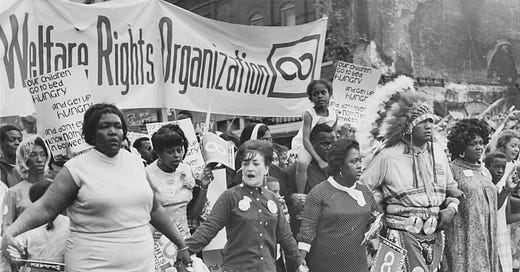MLK, Guaranteed Income, & Disability
The floor for "economic security" is lower than our organizing is recognizing.
Like many holidays meant to celebrate transformative histories, Martin Luther King, Jr. Day can instead be a deradicalizing occasion. I thought today I’d offer some thoughts on a specific part of MLK’s legacy: his lesser-known call for guaranteed income (GI) - and how it relates to contemporary disability politics.
GI programs offer monthly direct cash transfers to people who need help. And when organizers talk about this work (like Michael Tubbs on NPR in 2021), they often cite MLK’s 1967 “Where Do We Go From Here?” speech and in his final book of the same title and year.
MLK named disability in his case for GI. Black single mothers of the National Welfare Rights Organization (NWRO) helped him understand that expanding access to employment was an incomplete approach. For “those at the lowest economic level,” including “the aged and chronically ill,” he said, “we must create incomes.”
But today’s GI movement, which has swelled since 2020, has abandoned the radical legacy MLK helped popularize. The NWRO proposed a Guaranteed Adequate Income. Not a cash supplement. An income that can actually support a family. Most programs across the U.S. today offer several hundred dollars per month (rarely over $1000) for only a short period of time.
This doesn’t just leave disabled people behind - it causes harm. Most often, GI programs force people enrolled in existing public benefit programs, like SNAP and SSI, to choose between accepting the cash payments and experiencing a double cliff (the cash reduces or eliminates other benefits and then disappears itself). Some programs even specifically exclude anyone who receives SSI. And people like Andrew Yang are hijacking the framework to imagine cash transfers as a consolidation or wholesale replacement of public benefit programs.
So what does this kind of organizing do for the people who need economic security the most? I urge you take to some time to read Talila Lewis’s recent interview with George Yancey for Truthout. If we sit with the truths of incarceration of disabled people - “arrested and incarcerated more often, held longer, suffer more and return more frequently and faster” - we must realize that the fragmentation and incoherence of the contemporary GI movement’s political analysis is a good example of how we tacitly justify the ongoing enclosure and extinction of disabled people. We look away from what must be dismantled.
As Lewis says, “We must create the conditions that bring forth a world where incarceration has no place.”
Today we behold some of the more spectacular dimensions of what Lewis has called “an incredibly effective and beguiling deradicalizing instrument of the colonial ‘civilizing project’” that is the legacy and popular understandings of “civil rights.” Spectacular honor gets bestowed upon those respected few “fighters” for justice, which can cement the lack of action to help the many nameless people fighting for their lives under white supremacy.
We need to meet the abstraction in some organizing language with specificity. And there’s so much more to do, like identifying the ways that our failure to imagine radical rejections of work is also how disability politics has committed to anti-Blackness by selling “independent living” as a promise to work in pursuit of legislation and regulation.
Maybe, hopefully, eventually our organizing won’t have to make compromises like this from the very start.
A quick caveat: I am extremely grateful to be learning about the GI movement in my role as Artist-Organizer with Creatives Rebuild New York, which is running a large GI program for artists. My writing here is my own reflection.





i was REALLY intrigued by the mention/link about the indie living movement at the end! it links to a thesis that ALSO looks really fascinating but... abstractly/indirectly related??
my appetite is particularly stoked to understand how ILCs have been reduced to the crusty NPIC mess that we currently have though if you have any leads! i have a feeling you of all people do!